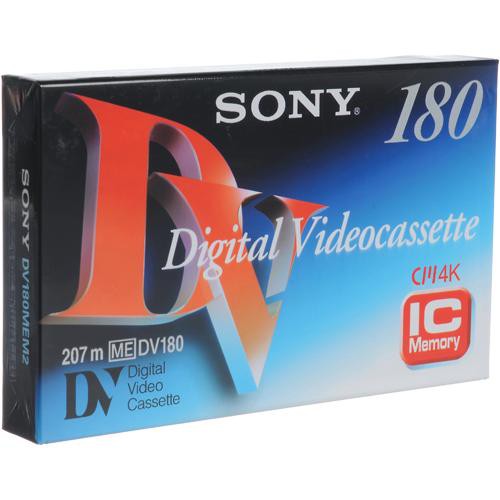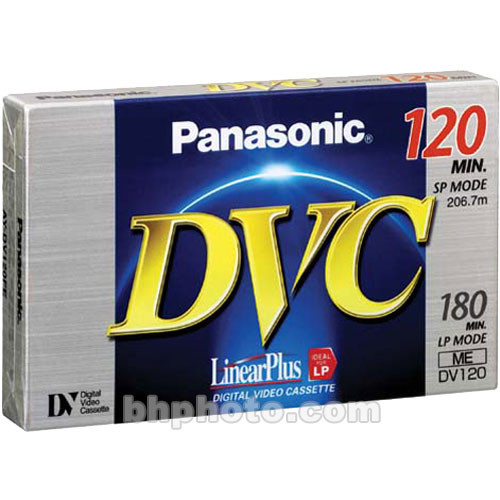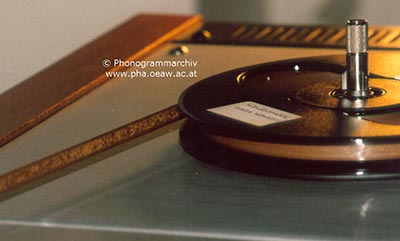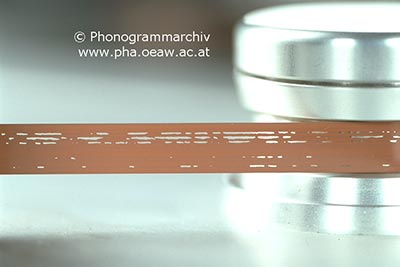| Table of Contents |
|---|
...
Standard DVC (Digital Video Cassette) is a digital video cassette format that utilizes the DV encoding standard. According to the DV encoding standard, video must be recorded using 6.35 mm (1/4 inch) magnetic videotape. However, any size cassette can be used to house DV tape. Originally, DV cassettes were available in two sizes: Standard DVC and MiniDV. Most DV camcorders available on the consumer market were compatible with either Standard DVC or MiniDV cassettes. Some professional equipment, such as the JVC Professional DV camcorder, could accommodate both cassette sizes. DVC cassettes are larger and can record more video than MiniDV cassettes (3.5 - 4 hours of compared to 60 minutes), however MiniDV cassettes quickly became more popular among consumers due to their small size and portability.
...
Identification
...
...
| Info | ||
|---|---|---|
| ||
| ||
| Column | ||
|---|---|---|
| ||
| width | 20% |
|---|
| title | Image source |
|---|
| Image source |
https://www.bhphotovideo.com/c/product/647486-DEMO/Sony_DV180MEM2_DV_180MEM2_180_Minute_Full.html & https://www.bhphotovideo.com/c/product/171695-REG/Panasonic_AY_DV120EJ_AY_DV120EJ_120_Minutes_Full.html
Physical Characteristics
...
| Tape width | ¼ inch (6.35mm) |
|---|---|
| Tape composition | Metal evaporate (ME) |
| Cassette dimensions | 97.5 × 64.5 × 14.6 mm |
| Identifying features | Cassettes labeled with DV or DVC |
| Common manufacturers/brands | Sony, Panasonic, JVC |
| Playback |
|
Technical Characteristics
...
| Record time | Standard play: 3 hrs Long play: 4.6 hrs |
|---|---|
| Track pitch | Standard play: 10 microns Long play: 6.7 microns |
| Track width | Standard play: 10 microns Long play: 6.7 microns |
| Record/playback speed | Standard play mode: 18.81 mm/sec |
| Bitrate | 25 Mbit/s |
| Bit depth | 8 bit |
| Colour sampling | PAL: 4:2:0 NTSC: 4:1:1 |
| Resolution | PAL: 720x576 |
| Compression | 5:1 DVC-format DCT compression (intra-frame) |
...
Types of damage and deterioration
...
Binder deterioration
| Info | ||
|---|---|---|
| ||
"1.1.3. Inspect for damage / Look for chemical deterioration / Binder degradation". In Audio Tape Digitisation Workflow. Accessed February 22, 2021. |
Description
Commonly known as "sticky shed syndrome." Affected records will have a visible gummy or powdery residue on the surface of the tape. This can damage both the recorded material and playback equipment. Back-coated tapes are most affected by this type of deterioration.
...
Baking: Holding the tape at an elevated temperature (45°C to 55°C) for a brief period of time (up to 36 hours) can temporarily remove moisture and allow normal playback for a period of one to two weeks. Tapes should not be rewound before baking.
Drop-out
https://www.musiikkiarkisto.fi/audio/audio113.html
| Info | ||
|---|---|---|
| ||
"1.1.3. Inspect for damage / Look for chemical deterioration / Binder degradation". In Audio Tape Digitisation Workflow. Accessed February 22, 2021. |
Description
A brief signal loss caused by a tape head clog, missing magnetic oxide particles, tape defect, or debris on the tape or machine. These factors can reduce head-to-tape spacing and result in the appearance of white spots or streaks on playback. Multiple drop-outs per frame will result in a snowy appearance.
...
Visit the /wiki/spaces/ALC/overview for further reading on /wiki/spaces/ALC/pages/1891631115.
References
...
AMIA. "Video Preservation Factsheets." Accessed December 10, 2020.
Bensinger, Charles. "Chapter 6: All about videotape." In The Video Guide, Second Edition, 71-75. Santa Barbara, California: Video-Info Publications, 1981.
Bogart, John Van. "What Can Go Wrong With Magnetic Media?" In Magnetic Tape Storage and Handling: A Guide for Libraries and Archives. Washington, DC: The Commission on Preservation and Access, 1995.
Casey, Mike. "FACET: Format characteristics and preservation problems." Bloomington, IN: Indiana University, 2007.
Gibson, Gerald. D. "Magnetic tape deterioration: recognition, recovery and prevention." Paper presented at the IASA Conference, Perugia, August 26, 1996.
Jones, Gerald Everett and Pete Shaner. "DV Technology and the Camcorder." In Real World Digital Video. Second Edition. Peachpit Press, 2005.
JVC Victor Company of Japan Limited. "Professional DV." Accessed February 2, 2021.
MediaCollege.com. "DV video." Accessed February 2, 2021.
Nielsen, Rebecca. "Media Recognition: DV Part 2." Bodleian Libraries. March 26, 2012.
Wheeler, Jim. "Videotape preservation handbook." 2002.
Wilt, Adam J. "The DV, DVCAM & DVCPRO Formats: The DV formats tabulated." August 28, 2005.
Wilt, Adam J. "The DV, DVCAM & DVCPRO Formats." July 16, 2006.
Version history
...
| Version | Date | Author(s) | Version Notes |
|---|---|---|---|
...



